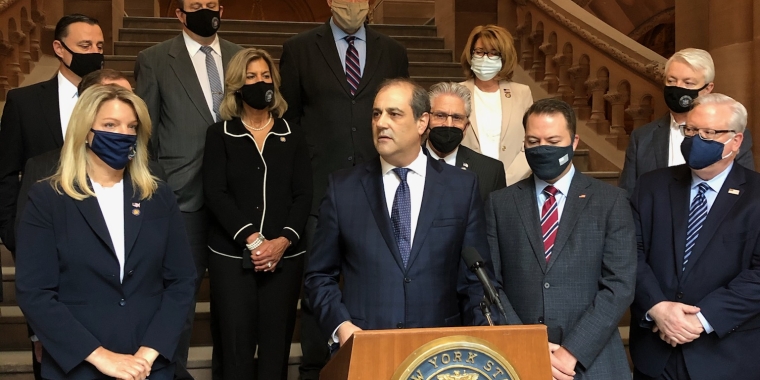Senator Andrew Lanza, Chairman of the Senate Ethics Committee & Co-Chair of the Legislative Ethics Commission, Announces New Ethics Reform Law
Andrew J Lanza
August 16, 2011
-
ISSUE:
- Ethics
-
COMMITTEE:
- Ethics and Internal Governance
New law addresses major inadequacies in current ethics system to restore public trust in government
The "Public Integrity Reform Act of 2011," sponsored by Senator Andrew Lanza, was signed into law this week establishing unprecedented transparency, strict disclosure requirements, and a strong independent monitor with broad oversight of New York State government.
Once a national model, New York State government's reputation has been widely discredited through corruption, a lack of independent ethical oversight, and a failure to require more robust disclosure of outside income sources. The Public Integrity Reform Act of 2011 includes:
· Greater Financial Disclosure: Financial disclosure statements filed with the new Joint Commission on Public Ethics from elected officials will now be posted on the internet and the practice of redacting the monetary values and amounts reported by the filer will be ended. The Act also includes greater and more precise disclosure of financial information by expanding the categories of value used by reporting individuals to disclose the dollar amounts in their financial disclosure statements. The Act requires disclosure of the reporting individual's and his or her firm's certain outside clients and customers doing business with, receiving grants or contracts from, seeking legislation or resolutions from, or involved in cases or proceedings before the State as well as certain of such clients that were brought to the firm by the public official.
· Increased Access to Who is Appearing Before the State and Why: The Act establishes a new database of any individual or firm that appears in a representative capacity before any state governmental entity.
· Additional Disclosures for Registered Lobbyists: The bill expands lobbying disclosure requirements, including the disclosure by lobbyists of any "reportable business relationships" of more than $1,000 with public officials. It also expands the definition of lobbying to include advocacy to affect the "introduction" of legislation or resolutions, a change that will help to ensure that all relevant lobbying activities are regulated by the new Joint Commission.
· Forfeiture of Pensions for Public Officials Convicted of a Felony: Certain public officials who commit crimes related to their public offices may have their pensions reduced or forfeited in a new civil forfeiture proceeding brought by the Attorney General or the prosecutor who handled the conviction of the official.
· A New Joint Commission on Public Ethics: The Joint Commission on Public Ethics will replace the existing Commission on Public Integrity with jurisdiction over all elected state officials and their employees, both executive and legislative, as well as lobbyists.
· Clarifying Independent Expenditures For Elections: The Act requires the state board of elections to issue new regulations clarifying disclosure of Independent Expenditures.
· Increased Penalties for Violations: The Act substantially increases penalties for violations of the filing requirements and contribution limits in the Election Law, and provides for a special enforcement proceeding in the Supreme Court. The bill also increases penalties for violations of certain provisions of the state's code of Ethics that prohibits conflicts of interest.
###
Share this Article or Press Release
Newsroom
Go to Newsroom

Senator Lanza Announces Italian American Scholarship for 2021
February 1, 2021

NYS Senate Republicans: Stop The Middle-Class Tax Hike!
January 25, 2021
